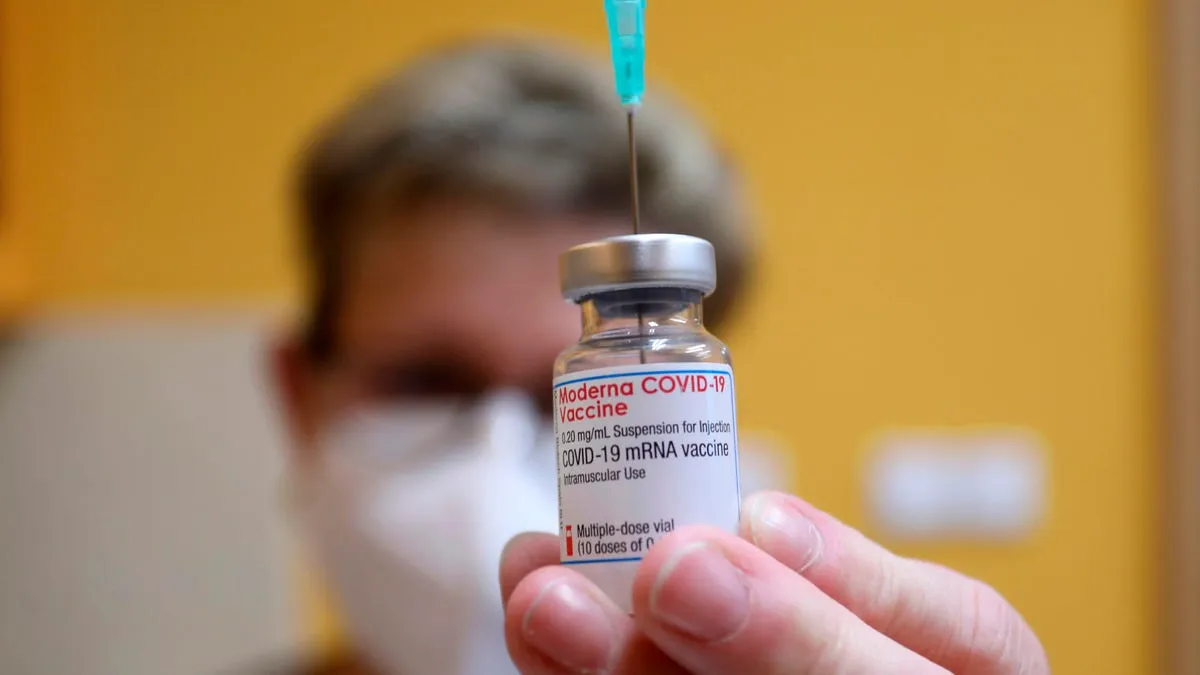Moderna shareholders had a bad week last week.
The biotech company's shares plunged 6.7% on Thursday, followed by another 5.6% on Friday after its earnings report gave investors a glimpse into what the company expects its post-pandemic financial results to look like in the near future.
It is estimated that the selloff took $7 billion off of Moderna MRNA +0.62% 's market value, which had fallen to $53.5 billion as of Monday afternoon.
For Moderna (ticker: MRNA), the earnings announcement was one of those moments in which the rubber hits the road, as investors for the first time were able to understand what the implications of a drop in Covid-19 vaccine sales were for the company for the first time since the vaccine was first authorized late 2020.
It seems that some of the problems that Moderna put off during the boom that accompanied the pandemic, namely various intellectual property wrinkles, have now finally surfaced.
In 2021, the company's cost of sales was 15% of its product sales, but that number grew to 29% in 2022, and the company said that the cost of sales would be between 35% and 40% in 2023.
As Mani Foroohar of SVB Securities wrote last week, the increase in Moderna’s cost of goods sold could be indicative of a margin erosion not seen in the sector since the collapse of the [hepatitis C virus] market. In 2017, Gilead Sciences GILD –0.38% (GILD) experienced a financial crisis after its hepatitis C treatments were effective in curing the disease, but its revenues were falling as a result.
Moderna shares were downgraded by Foroohar, who cut his rating from Market Perform to Underperform.
Despite the bleak outlook for Moderna, the company's pipeline is delivering a number of promising new drugs, and investors won't have to wait too long for new breakthroughs that might have a significant impact on its share price in the coming years.
In a similar fashion to pharmaceutical companies like Pfizer PFE -1.48% (PFE) and GSK GSK -1.03% (GSK), Moderna is developing a vaccine to prevent the respiratory syncytial virus. Efficacy results from a Phase 3 study suggest that Moderna's version is likely to be competitive with the other two versions in terms of efficacy. Moderna expects to file for approval in the first half of this year, which means that the vaccine will go on sale next year, so the GSK and Pfizer vaccines are expected to hit the market later this year.
In contrast, the results of a study conducted earlier this month on Moderna's flu vaccine were mixed. There is another study that is currently being conducted. According to Jefferies analyst Michael Yee, the full Phase 3 flu data are expected to be available at the end of March. If everything goes according to plan, a flu vaccine could hit the market in 2024 if everything goes according to plan.
The most interesting product that Merck MRK –1.11% has to offer may be its personalized cancer vaccine, which returned promising results in combination with Merck MRK –1.11% 's (MRK) Keytruda late last year. As part of this year's Phase 3 trial, the company will also test a variety of other tumor types in addition to skin cancer.
Moderna is also working on a combination respiratory virus vaccine that will be released later this year, as well as a cystic fibrosis treatment that will be released later this year on which it is collaborating with Vertex Pharmaceuticals (VRTX).
“The stock is a pipeline stock,” Yee wrote on Feb. 23.
It is still worth watching the concerns raised last week.
Moderna announced that it had made a $400 million "catch-up payment" to the National Institute of Allergy and Infectious Disease, a part of the National Institutes of Health, as part of a license agreement signed in December, under which Moderna will have to pay a low single-digit royalty on all future sales of the Covid-19 vaccine. It isn't clear whether or not the agreement covers a separate dispute over a claim of credit for inventing a component of the vaccine, according to a report in the New York Times, but rather how the vaccine's mRNA code was designed.
The mRNA-based medicines developed by Moderna have been the subject of several intellectual property claims, including from the National Institutes of Health.
SVB's Foroohar wrote that the IP challenges of mRNA were relegated to the future during the vaccine boom, at least for the time being. In the current situation, he said, since Moderna has agreed to pay royalties to the National Institutes of Health, he expects that the company might also end up paying royalties to Arbutus Biopharma (ABUS) and Alnylam Pharmaceuticals (ALNY), which have both filed patent lawsuits against Moderna.
There is a prediction by Moderna that 5% of sales in 2023 will be allocated to royalties.
The share price of Moderna was flat on Monday, as investors took a breather from the selloff that occurred last week.
In fact, they won't have to wait long for new data: On Tuesday, the FDA's outside advisors will begin a two-day meeting focused on Pfizer and GSK's RSV vaccines. The outcome of this meeting could have a significant impact on Moderna's business.

Subscribe to our newsletter!
As a leading independent research provider, TradeAlgo keeps you connected from anywhere.








